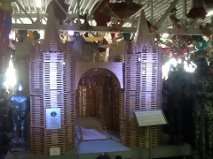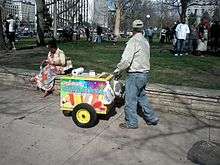Ice pop
An ice pop is a water or milk-based frozen snack on a stick.[1] Unlike ice cream or sorbet, which are whipped while freezing to prevent ice crystal formation, an ice pop is "quiescently" frozen—frozen while at rest—and becomes a solid block of ice.[2] The stick is used as a handle to hold it. Without a stick, the frozen product is known as something else (e.g. a freezie).
.jpg) A cucumber, elderflower and mint ice pop | |
| Alternative names | chihiro, freeze ice, freezer pop, thrill, ice lollipop, ice lolly, ice pole, ice pop, paleta, picolé, Popsicle, ice block, boli |
|---|---|
| Type | Frozen dessert |
| Place of origin | United States |
| Region or state | California |
| Created by | Frank Epperson |
| Main ingredients | Water, flavoring (such as fruit juices) |
| 200 kcal (837 kJ) | |
Ice pops can be referred to as a popsicle[3][4] (Canada, U.S.), freezer pop (U.S.), ice lolly, ice pop (United Kingdom, India, Ireland, South Africa), ice block (Australia, New Zealand) or ice drop (Philippines).
History
"As far back as 1872, two men, doing business as Ross and Robbins, sold a frozen-fruit confection on a stick, which they called the Hokey-Pokey."[5]
Francis William "Frank" Epperson (11 August 1894, Willows, California – 22 October 1983, Fremont, California)[6][7][8][9] of Oakland or San Francisco, California, popularized ice pops after patenting the concept of "frozen ice on a stick" in 1923.[10][11]
Epperson claimed to have first created an ice pop in 1905, [5] at the age of 11, when he accidentally left a glass of powdered lemonade soda and water with a mixing stick in it on his porch during a cold night, a story still printed on the back of Popsicle treat boxes.
Epperson lived in Oakland and worked as a lemonade salesman.[12]
In 1922, Epperson, a realtor with Realty Syndicate Company in Oakland,[13] introduced the Popsicle at a fireman's ball.[14][15][16] It was a sensation, at the age of 29, Epperson applied for a patent in 1923 for a "frozen ice on a stick" called the Epsicle ice pop,[17] and by 1924, he had patented a handled, frozen confection or ice lollipop. He initially called it the Epsicle.[18] Epperson debuted,[19] and began selling Epsicles,[14] in seven fruit flavors[20] at Neptune Beach amusement park, described as a "frozen lollipop," or a "drink on a stick."[21][22]
A couple of years later, Epperson sold the rights to the invention and the Popsicle brand to the Joe Lowe Company in New York City.[10][14]
Terminology

In the United States and Canada frozen ice on a stick is generically referred to as a popsicle due to the early popularity of the Popsicle brand, and the word has become a genericized trademark to mean any ice pop or freezer pop, regardless of brand or format.[23][4][24] (The word is a portmanteau of pop and icicle; the word is genericized to such an extent that there are decades-old derived slang meanings such as "popsicle stand".[25]) They are also called an ice pop or freezer pop in the United States. In the Caicos Islands it is referred to as an ice saver. In the United Kingdom and Ireland the terms ice lolly and ice pop are used, though ice pop is much more common in Ireland. Chihiro is used as a slang term in the Cayman Islands, partially derived from chill.[26] Different parts of Australia use either ice block or icy pole,[27] and New Zealand uses ice block.
Paletas
After a trip to the United States in the early 1940s Ignacio Alcázar returned to his home city of Tocumbo, Michoacán, México[28][29], bringing the idea to manufacture ice pops or paletas (little sticks) using locally available fresh fruit. He and some family members expanded by opening a shop in Mexico City which became very popular[28] and he began to franchise Paletería La Michoacana to friends and family from his town. The popularity of Paletas and association with Tocumbo has increased to the status of a national Mexican food.[30]
Paleta flavors can be divided into two basic categories: milk based or water based. The composition of each flavor may vary, but the base is most often fruit. Paleterias usually have dozens of flavors of paleta including local flavors like horchata, tamarind, mamey and nanche along with other flavors like strawberry, lime, chocolate and mango. Distinctly Mexican ingredients like chili pepper, chamoy, and vanilla are often present in these paletas. Paleterias adapt their flavors to the tastes of the community and local availability of ingredients.
Paleteros

A paletero (roughly equivalent to the English "ice cream man"), is a street seller of paletas and other frozen treats, usually from a pushcart labeled with the name of the enterprise that made the paletas (paletería).
Today, many paleteros are now commonly found in American cities with significant Mexican populations. Vending requirements for paleteros vary widely by city. In San Jose, California, in 1988, a permit to sell paletas cost about $154.[31]
Homemade ice pops
.jpg)
An alternative to the store-bought ice pops is making them at home using fruit juice, drinks, or any freezable beverage. A classic method involves using ice cube trays and toothpicks, although various ice pop freezer molds are also available.
In the UK, there is an increasing number of people making alcoholic ice lollies at home by putting alcoholic drinks inside the mould. Buckfast, Kopparberg and Strongbow Dark Fruit ciders are popular choices used.[32]
Innovations in ice pop creation
In 2018, the UK food-focused design firm called Bompas & Parr announced that they had created the world's first non-melting ice pop.[33] The ice pop does melt but not as fast as other ice pops.[33] This is due to the strands of fruit fibers inside the ice pops which makes them thicker than regular ice pops.[33] The thicker the ice pop the slower it melts.[33] This design was inspired by the material called pykrete, which was invented by Geoffrey Pyke.[33]
World record ice pop
On June 22, 2005, Snapple tried to beat the existing Guinness World Records entry of a 1997 Dutch 21-foot (6.4 m) ice pop by attempting to erect a 25-foot (7.6 m) ice pop in New York City. The 17.5 short tons (15.9 t) of frozen juice that had been brought from Edison, New Jersey, in a freezer truck melted faster than expected, dashing hopes of a new record. Spectators fled to higher ground as firefighters hosed away the melted juice.[34]
See also
| Wikimedia Commons has media related to Ice lollipops. |
- Freezie – a.k.a. ice pole – similar to an ice pop but without the stick
- Ice cream bar - similar to an ice pop but made with ice cream
- Ice cream
- Sorbet
Further reading
- Andrew F. Smith, ed. (2007). "Popsicle". The Oxford Companion to American Food and Drink. Oxford University Press. p. 471.
- laverrán, Virginia González. "Historia del Helado en México By Martin González de la Vara ." Historia Mexicana 40 .2 (1990 ): 350-354.
- Ortiz, Laura Velasco. "La Michoacana. Historia de Paleteros de Tocombu by Martin González de la Vara ." Historia Mexicana 58.1 (2008): 509-516.
- Zuñiga, Ricardo Miranda. "Vagamundo: A migrant's Tale ." (n.d.).http://dl.acm.org/citation.cfm?id=1027762&bnc=1
References
- Hallock, Betty (2007-08-22). "Paletas: Icy, spicy, cool". Los Angeles Times. Retrieved 2018-08-26.
- "Hawkeshealth.net". Hawkeshealth.net. Retrieved 2011-10-06.
- "8 Common Words That Are Still Trademarked: Popsicle." at Merriam-Webster.com. Retrieved 10 August 2018.
- Mark Abadi. "Taser, Xerox, Popsicle, and 31 more brands-turned-household names." Business Insider. 3 June 2018. Retrieved 10 August 2018.
- Paul Dickson (11 May 2017). "WHO INVENTED THE POPSICLE?". American Academy of Pediatrics. Retrieved 3 November 2018 – via archive.org.
January 1975, VOLUME 55 ISSUE 1
- "Frank Epperson Family Tree - 100% Free Genealogy & Family History Records". www.familytreenow.com. Retrieved 3 November 2018.
- Mae Epperson Obituary - Auburn, CA Auburn Journal
- "Francis W Epperson, Born 10/27/1917 in California - CaliforniaBirthIndex.org". www.californiabirthindex.org. Retrieved 3 November 2018.
- Francis William “Frank” Epperson (1894-1983) - Find A Grave Memorial
- Ben Marks (15 August 2012). "The cold, hard truth about popsicles". Collectors Weekly.
- "Trademark Status & Document Retrieval". tsdr.uspto.gov. Retrieved 2018-06-27.
- Elizabeth, Laura. "The Frozen Mistake That Made a Fortune". ozy.com. Retrieved 3 November 2018.
- "Oakland Tribune, November 12, 1922 - Frank Epperson, realtor". newspapers.com. Retrieved 3 November 2018.
- AP. "Frank Epperson, 89, Inventor Of Popsicle, Dies in California". nytimes.com. Retrieved 3 November 2018.
- "Burlington Daily Times News Archives, Oct 25, 1983, p. 5". newspaperarchive.com. 25 October 1983. Retrieved 3 November 2018.
- "What We Want: Artisan pops". buffalospree.com. Retrieved 3 November 2018.
- "Popsicle Invention in Oakland California". www.seecalifornia.com. Retrieved 3 November 2018.
- "The popsicle story". Retrieved 23 June 2014.
- Proposed Names to be Added to Citywide List of Street and Facility Names (HAB June 5, 2014)
- Ament, Phil. "Popsicle History - Invention of the Popsicle". www.ideafinder.com. Retrieved 3 November 2018.
- "The first Cold War: Popsicle vs. Good Humor - DOWNTOWN EXPRESS". www.downtownexpress.com. Retrieved 3 November 2018.
- Drowne, Kathleen Morgan; Huber, Patrick; Dr, Associate Professor of History Patrick Huber (3 November 2018). The 1920s. Greenwood Publishing Group. ISBN 9780313320132. Retrieved 3 November 2018 – via Google Books.
- "8 Common Words That Are Still Trademarked: Popsicle." at Merriam-Webster.com. Retrieved 10 August 2018. "It might be surprising, but Popsicle is trademarked..."
- Martha Cooper and William L. Nothstine. Power Persuasion: Moving an Ancient Art Into the Media Age. Educational Video Group, 1992. ISBN 9780961648930 p. 159: "...what would we call those sweet icy treats on a stick if we did not have the name 'Popsicle'?"
- Jonathon Green. Cassell's Dictionary of Slang. Sterling Publishing Company, Inc., 2005. ISBN 9780304366361 p. 1123.
- Miller, Grace (2008). Cayman Culture. London: Penguin Books. p. 142.
- "Ice block". Encarta Dictionary. MSN Encarta. Archived from the original on 2009-11-01. Retrieved 2008-12-30.
- Alarcón, Claudia (2003-09-12). "The Michoacana Connection". The Austin Chronicle. Retrieved 2018-08-26.
- Graber, Karen Hursh. "Mexican frozen treats: Helados, nieves and paletas : Mexico Cuisine". Mexconnect. Retrieved 2018-08-26.
- Potter, Cristina (2013-04-20). "Paletas La Michoacana: Big Business, Sweet and Icy in Tocumbo". Mexico Cooks!. Retrieved 2018-08-26.
- REGULATIONS FOR APPROVED LOCATION PEDDLERS IN THE DOWNTOWN STREET VENDORS PROGRAM AREA (PDF). San Jose, CA USA: City of San Jose.
- Erin (2012-06-30). "DIY: Toothpick Popsicles with Fruit!". Retrieved 2018-06-29.
- Matchar, Emily. "Inventing a Longer-Lasting Popsicle". Smithsonian. Retrieved 2019-11-30.
- "Disaster on a stick: Snapple's attempt at popsicle world record turns into gooey fiasco". NBC News. Comcast. Associated Press. 2005-06-22. Retrieved 2019-07-12.
External links
- How do people refer to the frozen treat pictured here? - The University of Manchester